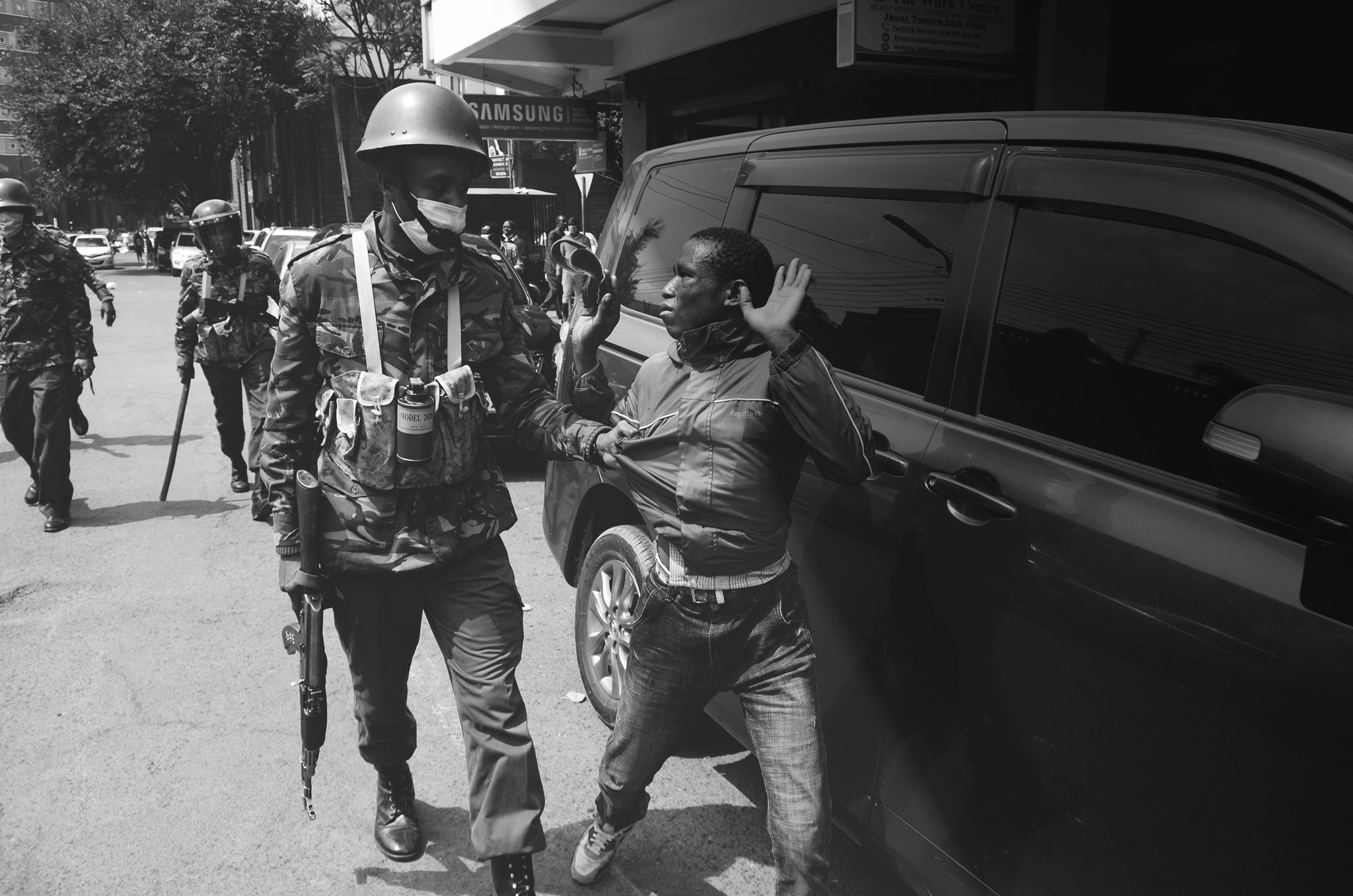
Tear gas and arrests as Kenyans protest police brutality in Nairobi, Kenya, July 2020. Drop here! Dennis Sigwe/ SOPA Images
The pandemic has prompted governments around the world to enact measures to contain the virus. But some have also used COVID-19 as an opening to expand surveillance of everyday citizens and restrict free speech and other civil liberties.
“There is no doubt it was critical for governments to act swiftly to respond to the public health crisis,” says Kerri Kennedy, associate general secretary of international programs. “At the same time, it immediately became clear to AFSC and our partners around the world that we needed to monitor and resist the misuse of measures that restrict civic space and nonviolent action—authoritarian measures that had the potential to far outlast the pandemic.”
AFSC launched the Under the Mask project to track governmental abuses of power in the context of the pandemic. In the summer of 2020, as international travel came to a standstill, AFSC brought together activists and civil society organizations from 32 countries for online discussions about their experiences and ways to counter oppressive state measures.
In addition to suppressing free speech and other civil liberties, some governments have used aggressive tactics to deny the rights of minorities, migrants, and others—from police brutality to the demolition of homes and marketplaces. Others have used “shock and awe” tactics and smear campaigns to stoke fears and divisions, stop elections, and silence dissenting voices. Such measures accelerate a global shift toward authoritarianism over the past decade that has led to the shrinking of civic space.
“Governments using crises to pass harmful policies is not new, but COVID-19 has given them the opportunity to do it with little international attention—and reduced ability for communities to mobilize,” says Sahar Vardi, Israel Program coordinator. AFSC’s Under the Mask project is providing civil society organizations, peacebuilders, the media, and others with tools, trainings, and other resources to monitor government abuses—and push back against dangerous policies that infringe on human rights and civil liberties.
Government restrictions around the world
There are many examples of government responses to COVID-19 that have had little do with protecting public health—and, in some cases, further endangered residents.
In Kenya, police have used heavy-handed enforcement to enforce lockdowns. In March 2020, dozens of people were injured by police as they scrambled to get home from work before curfew in the coastal city of Mombasa. Africa Regional Director Kennedy Akolo says: “We saw the police using very big sticks to beat up people who were trying to cross by ferry, when not everybody can get on the ferry at the same time. Some people were beaten up or rounded up. There was excessive violence and total mistreatment where people were beaten for absolutely nothing.”
In the United States, the Trump administration had long worked to reduce migration and dismantle the U.S. asylum system. At the start of the pandemic, the administration closed the southern border to asylum seekers—violating both U.S. and international law as well as contradicting the advice of public health experts who found the draconian decision had no public health justification.
The order resulted in rapid-fire deportations of tens of thousands of migrants—including children—at the border, stranding many in unsanitary conditions without access to support services. As of this writing, the border remained closed to most asylum seekers under the Biden administration—just one example of how measures implemented during crises can be difficult to reverse.
In Israel, one of the first countries to impose a nationwide lockdown, the government imposed extreme restrictions on the right to protest in Jerusalem—amid growing demonstrations demanding an end to the current administration. The government also expanded surveillance technology using cell phone data—ostensibly to track people suspected or confirmed to have the virus but raising privacy concerns among activists.
“It was alarming to see how quickly Israeli security services were able to put something like that in place,” Sahar says. “And the moment those technologies are in place, they're normalized. The moment security services become used to the fact they can have access to all this information, they're not going to let go of that.”
The past year has shown the many ways that governments can exploit crises to enact policies that would be unacceptable in normal times. But it has also shown us countless examples of individuals, communities, and civil society organizations that have courageously stood up to resist authoritarianism—and defend human rights and civil liberties for all.
Our Under the Mask project is one contribution to that courageous resistance. In the coming year, AFSC will host more opportunities for activists and civil society organizations to come together and support each other’s efforts.
“We know that a free civil society is an essential element of a healthy society,” Kerri says. “Those in positions of power have an important role to play in the current crisis. And civil society has a critical voice, as well. It’s imperative for all people to work together to grow justice and equality, while protecting public health.”
Visit our site for:
- Reports and resources on government restrictions during COVID-19
- Our limited series “Under the Mask” podcast
- Upcoming trainings and webinars
- VISIT: underthemask.afsc.org
Drop here!